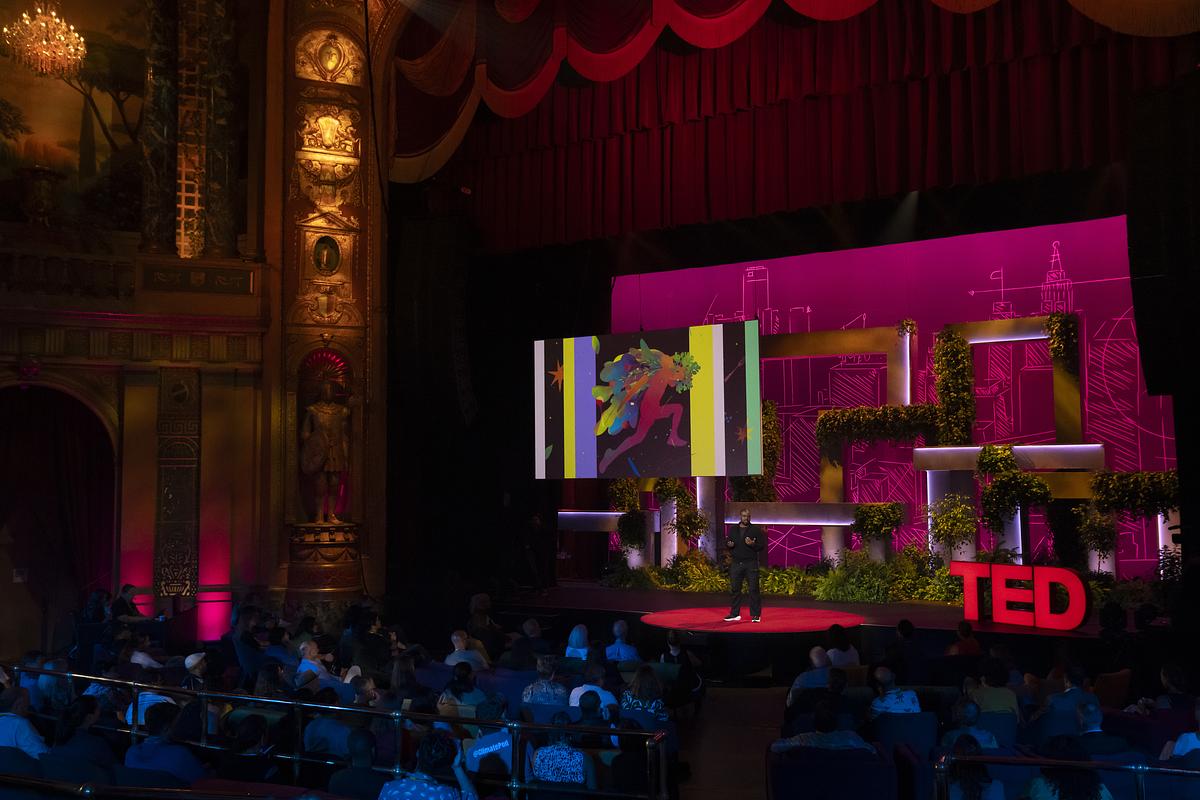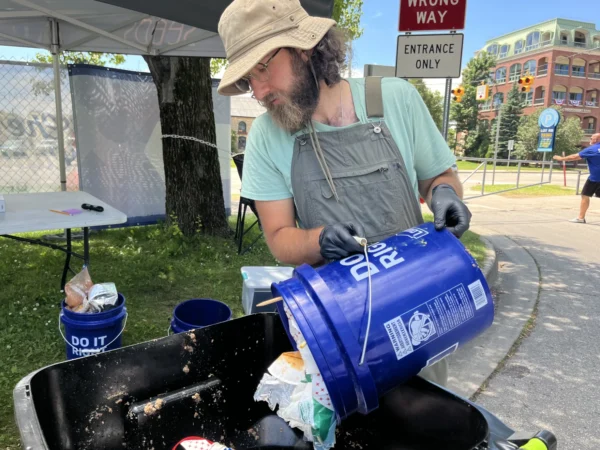
With nearly 125 million buildings across the United States, all these spaces account for about 30 percent of the country’s emissions. In 2014, Donnel Baird created BlocPower to get these spaces off fossil fuels by changing out old water systems, gas ovens, gas and oil furnaces and air conditioning units with electric equipment, like air source heat pumps, which are compatible with renewable energy options.
Baird spoke at the TED Countdown Summit about greening America’s buildings with BlocPower, a company which doesn’t just replace these things, but adds renewable energy options like solar panels, while providing jobs for people in the communities they’re working with.
He sat down with us on the last day of the conference to talk about how he got his start, what his company does to improve quality of life and what Detroit’s role could be in the climate crisis.
I read that you started working in politics, in Obama’s first administration? I was wondering if you could explain how that experience helped build a foundation for what BlocPower is?
Donnel Baird: I was trained as a community organizer. I actually was trained by the same people that trained Barack Obama as a community organizer, 30 years ago–Arnie Graff and Mike Egan. The first time I met him, he was a senator at the time, Senator Obama. I talked to him about his community organizing training, and he said he learned more from community organizing than in law school, just that it was the most important education he ever received. And I agree. I think that the idea of meeting with people one-on-one, finding out what their self-interest is, not just their issues, but the things that they care about and motivate them into action.
It really influences the way that I think about changing human behavior; changing the behavior of families and neighborhoods and communities. When we were working on the presidential campaign, Obama did a great job of making sure that community organizing tactics and techniques were part of our campaign, and then part of how we thought about engaging with families as part of the first administration. So I learned a lot. And so it’s been a dramatic influence. So, we have community advisory boards with local principals, local rabbis and priests and preachers from the religious institutions. Heads of labor unions, tech firms, real estate folks who own buildings and manage buildings–all of them are on a community advisory board. And that’s a structure that we got directly from community organizing. So every city we go into, we have a community advisory board.
Can you give us an example of the improvement in quality of life that BlocPower provides?
Baird: Burning fossil fuels in buildings is really dangerous and unhealthy. I remember I was visiting Flint, like eight months ago, and on the local news unfortunately a woman in Flint, her house exploded because she had gas leaks. She had called the utility company a couple of times. They couldn’t find it or couldn’t figure it out. And then, unfortunately, her house exploded and so did the neighbor’s house, and she died. I think we forget how dangerous fossil fuels can be.
Even if they’re not exploding, gas ovens, for example, and gas heating systems are responsible for 13% of chronic childhood asthma in America. There’s a lot of kids that have asthma, and a lot of that is caused by the way we heat and cool our buildings, and how we choose to cook. There’s a new study that talks about benzene and methane being released from fossil fuels in our homes, even when they’re not on. So even if your oven isn’t on, it’s still releasing methane and benzene and nitrogen dioxide, and benzene causes cancer. There’s a new study from Stanford that shows that a lot of people, they think they’re pretty healthy, but they’re breathing in benzene, which is worse than secondhand cigarette smoke. And so from a health perspective, I think there’s a dramatic quality of life improvement. Of course, we remove lead and mold and asbestos when we go in and electrify and green the building. We put in organic insulation in the walls and in the attic, so it can be more comfortable. When we put in solar panels, we might replace the roof. So the value of the house goes up, it’s more comfortable, and it’s healthier. Plus, you should be saving money every single month on your energy bill. And so as energy costs continue to go up, if you have solar panels, that’s going to provide you low cost, consistent, affordable electricity. So there’s a dramatic impact on quality of life.
Last thing, we really focus on training and hiring folks from underserved communities to do the installations and to do the construction work. These are great green jobs. We train people on how to use augmented reality. We train them on how to do electrical wiring so that they can install electric vehicle charging or solar panels. We teach them how to do carpentry so they can fix a roof or blow insulation. These are great jobs, and in an underserved community you can really stabilize a community.
What do you see as Detroit’s role in the climate crisis?
Baird: Watching Detroit embrace and lead the global electric vehicle revolution is really important for the country. Detroit is a smaller city than it used to be. And so the energy in the electricity grid also needs to start to get smaller.
I’ll give an example: it used to be like when you looked at a computer, in 1960. It was a giant IBM computer, a mainframe, and it was like in a giant auditorium or basement. Now we have supercomputers that are smaller than a credit card, that we can stick in our pocket. Or, you think about the media. It used to be that we had like three channels; CBS, NBC, and ABC and now we all can produce our own media using our supercomputers in our pocket. It’s been decentralized. And so energy in America, and in the world, should be decentralized.
Beyond electric vehicles, instead of burning gas or coal in fossil fuel plants across Michigan and then sending electricity down to Detroit, we actually can have local electricity from solar panels. Stored locally on small batteries in people’s garages and driveways, stored in the batteries of the electric vehicles. I think the fact that the city has shrunk and you guys have such great expertise mechanically, I think Detroit can be the leader in that.
And last, I mean, we are in a hyper-political environment. Detroit and Michigan, are extremely important places because of your swing state. There’s a lot of attention from the left and the right on everything that’s happening in Michigan, and in Detroit. And so you’ve got a lot of influence over politics. You’ve got a lot of influence over buildings and green energy. You’ve got a lot of influence over vehicles and transportation. Obviously, you have the cultural influence. You got the lions. Every American knows Detroit and cares about how Detroit’s doing, and that gives you a cultural power. And when combined with the economic power that green energy can unlock, I think Detroit should have a huge, huge, huge impact on what happens for the future of the country.
Could you tell us a bit more about the deal that you just made with the city of Ithaca, New York? I’m curious how long that took and what went into solidifying that as a city-wide project?
Baird: Ithaca has about 6000 buildings and Cornell University is there. So they got this giant university with thousands and thousands of students from all over the world. There’s Ithaca College as well. The kids, the students, decided that they wanted Ithaca to be green. They were able to get organized and dominate the local politics, and basically, force the mayor and the city council, from what I can tell, to make a really extraordinary commitment to be the first city in the country to be 100% green by 2030. It took years of work for Ithaca to decide to do that.
We have seen other cities; Menlo Park, San Jose. They didn’t take years, they took 6 to 8 months. The time is getting shorter and shorter, as new cities also raise their hands and say, well, we want to be 100% green here. Itaca went first and so took a longer time, but they built a model that other cities can adopt. And so we’re really grateful to them for that.
What is something that you previously didn’t know was possible, but that you’re feeling really excited about when it comes to dealing with the environmental crisis?
Baird: As someone who’s been working on climate for 20 years, it’s only in the last 24 months that I realized that we could really move buildings entirely off of fossil fuels. And because there’s 125 million buildings in America and it’s 30 percent of our emissions, if we moved all 125 million buildings off of fossil fuels, we would dramatically alter the global trajectory of the climate crisis, while inspiring other countries around the world to do the same.
That wasn’t possible a few years ago, but it is now. I think that’s really exciting because it means that there can be some real hope. Not hope because we’re being optimistic and we’re crossing our fingers to hope it all works out. Hope combined with will and willpower, that we can go building to building and do this. We don’t need to invent new technology. We don’t need new software. There’s plenty of money to do it, it’s just will. Having a sense of control over some of what happens next, that we don’t have to go pass more laws. We don’t have to figure out how to scrape carbon from the sky. We will have to do all of those things, but while we’re doing that, we can also be about the business of reducing emissions building-by-building and city-by-city. I’m really excited about that.
What do you hope the legacy of Blocpower will be one day?
Baird: Oh, well, not to be over-simplistic, but we want to green all the buildings and then we’ll move on to the next problem. All the buildings. All the buildings, in America and then the world.
Catch more news at Great Lakes Now:
The TED Countdown Summit is coming to Detroit
Climate change could spell catastrophe for Detroit’s older homes
Featured image: Donnel Baird speaks at SESSION 6 at TED Countdown Summit. July 11-14, 2023, Detroit, MI. Photo: Gilberto Tadday / TED




